Military experiment demonstrates intersatellite laser communications in low Earth orbit
Tuesday, 17 May 2022 20:09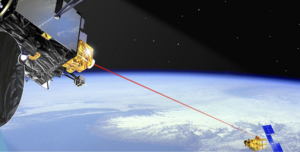
Two small satellites launched last summer by the Defense Advanced Research Projects Agency successfully established an optical link during a nearly 40-minute test.
The post Military experiment demonstrates intersatellite laser communications in low Earth orbit appeared first on SpaceNews.
Operational AST SpaceMobile satellites could proceed without prototype
Tuesday, 17 May 2022 19:37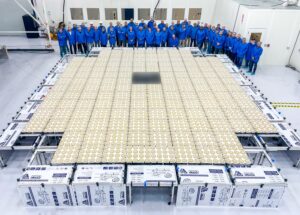
AST SpaceMobile will start deploying operational satellites in 2023 “even in the event of any complication” with the BlueWalker 3 prototype slated to launch this summer, an executive for the cellphone-compatible broadband constellation said.
NASA's InSight lander: The lonely fate of a robot on Mars
Tuesday, 17 May 2022 17:48
Covered in the red dust that sealed its fate, the NASA InSight lander is slowly shutting down, more than 250 million kilometers from home.
With its solar panels now obscured by the red planet's debris, the four-year-old robot is running out of power. One by one, its instruments are being taken offline: its robotic arm moving into "retirement pose," its seismometer likely to be turned off sometime in June.
Dr. Catherine Johnson, co-investigator on the InSight science team and professor in the department of earth, ocean and atmospheric sciences, discusses what the team discovered, what questions are left to answer, and just what will happen to the little lander that could.
What was the lander's mission and what did it find?
Foust Forward | Building a space industry in Steel City
Tuesday, 17 May 2022 16:42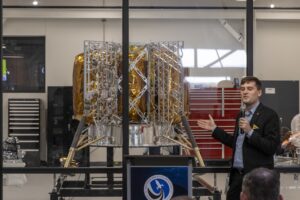
John Thornton and others want to ensure that Astrobotic isn’t the only space company in Pittsburgh or the wider region.
The post Foust Forward | Building a space industry in Steel City appeared first on SpaceNews.
DIU selects nuclear-powered spacecraft designs for 2027 demonstrations
Tuesday, 17 May 2022 13:00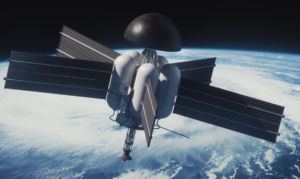
The Defense Innovation Unit announced May 17 it selected Ultra Safe Nuclear Corp. and Avalanche to develop small nuclear-powered spacecraft for in-space demonstrations planned for 2027.
The post DIU selects nuclear-powered spacecraft designs for 2027 demonstrations appeared first on SpaceNews.
Satellites key to Canada’s Arctic surveillance strategy
Tuesday, 17 May 2022 12:41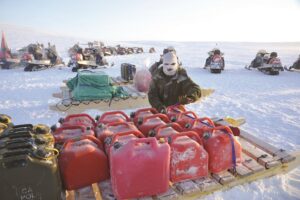
Citing a changing security climate, Canada is bolstering its defense and surveillance capabilities in the Arctic with a focus on using space assets and new technology.
The post Satellites key to Canada’s Arctic surveillance strategy appeared first on SpaceNews.
Uzbekistan woos Starlink, OneWeb to bring satellite broadband
Tuesday, 17 May 2022 12:38
The overtures to Starlink and OneWeb are part of the Uzbek government’s efforts to strengthen the Central Asian nation’s information technology competitiveness and provide better communications services to underserved remote areas.
The post Uzbekistan woos Starlink, OneWeb to bring satellite broadband appeared first on SpaceNews.
Dawn Aerospace wins Blue Canyon's X-SAT Saturn-Class propulsion business
Tuesday, 17 May 2022 09:13 Dawn Aerospace, a Netherlands-, New Zealand-and U.S.-based space transportation company, has been selected by Blue Canyon Technologies to provide turnkey chemical propulsion systems for the X-SAT Saturn satellite bus. Dawn will supply thrusters, tanks, control electronics, and full-service support in logistics and propellant loading for the ESPA Grande-class satellite.
Blue Canyon Technolo
Dawn Aerospace, a Netherlands-, New Zealand-and U.S.-based space transportation company, has been selected by Blue Canyon Technologies to provide turnkey chemical propulsion systems for the X-SAT Saturn satellite bus. Dawn will supply thrusters, tanks, control electronics, and full-service support in logistics and propellant loading for the ESPA Grande-class satellite.
Blue Canyon Technolo ISRO tests large human rated solid rocket booster for the Gaganyaan program
Tuesday, 17 May 2022 09:13 ISRO successfully completed the static test of a human-rated solid rocket booster (HS200) for the Gaganyaan Program at Satish Dhawan Space Centre (SDSC), Sriharikota, Andhra Pradesh on May 13, 2022, at 7:20 AM local time. HS200 rocket booster is the human-rated version of the well-proven S200 rocket booster of GSLV Mk III satellite launch vehicle, popularly known as LVM3.
The successful co
ISRO successfully completed the static test of a human-rated solid rocket booster (HS200) for the Gaganyaan Program at Satish Dhawan Space Centre (SDSC), Sriharikota, Andhra Pradesh on May 13, 2022, at 7:20 AM local time. HS200 rocket booster is the human-rated version of the well-proven S200 rocket booster of GSLV Mk III satellite launch vehicle, popularly known as LVM3.
The successful co What you need to know about NASA's Boeing Orbital Flight Test-2
Tuesday, 17 May 2022 09:13 NASA and Boeing are taking another major step on the path to?regular?human spaceflight to the International Space Station using American rockets to launch spacecraft from American soil with the second uncrewed test flight of a commercial crew spacecraft.
NASA's Boeing Orbital Flight Test-2 (OFT-2) is targeting launch of the CST-100 Starliner spacecraft on a United Launch Alliance Atlas V r
NASA and Boeing are taking another major step on the path to?regular?human spaceflight to the International Space Station using American rockets to launch spacecraft from American soil with the second uncrewed test flight of a commercial crew spacecraft.
NASA's Boeing Orbital Flight Test-2 (OFT-2) is targeting launch of the CST-100 Starliner spacecraft on a United Launch Alliance Atlas V r Could people breathe the air on Mars
Tuesday, 17 May 2022 09:13 Let's suppose you were an astronaut who just landed on the planet Mars. What would you need to survive?
For starters, here's a short list: Water, food, shelter - and oxygen.
Oxygen is in the air we breathe here on Earth. Plants and some kinds of bacteria provide it for us.
But oxygen is not the only gas in the Earth's atmosphere. It's not even the most abundant. In fact, only 2
Let's suppose you were an astronaut who just landed on the planet Mars. What would you need to survive?
For starters, here's a short list: Water, food, shelter - and oxygen.
Oxygen is in the air we breathe here on Earth. Plants and some kinds of bacteria provide it for us.
But oxygen is not the only gas in the Earth's atmosphere. It's not even the most abundant. In fact, only 2 Momentus "Go for Launch" for First Vigoride Mission
Tuesday, 17 May 2022 09:13 Momentus Inc. (NASDAQ: MNTS), a U.S. commercial space company that plans to offer transportation and other in-space infrastructure services, has announced that it has completed the integration of its Vigoride Orbital Transfer Vehicle and customer payloads on the SpaceX Falcon 9 launch vehicle that will be used for the Transporter-5 mission targeted for launch this month.
Momentus recently
Momentus Inc. (NASDAQ: MNTS), a U.S. commercial space company that plans to offer transportation and other in-space infrastructure services, has announced that it has completed the integration of its Vigoride Orbital Transfer Vehicle and customer payloads on the SpaceX Falcon 9 launch vehicle that will be used for the Transporter-5 mission targeted for launch this month.
Momentus recently EUSPA celebrates its first 365 days of new Galileo operations
Tuesday, 17 May 2022 09:13 The EU Agency for the Space Program celebrates its first anniversary with new services, a new satellite and even more end users.
Time flies when you're busy getting things done. And in the first year of its existence, the EU Agency for the Space Program (EUSPA) has gotten a lot of things done.
"EUSPA's launch one year ago today represented the start of a new era for the EU Space Prog
The EU Agency for the Space Program celebrates its first anniversary with new services, a new satellite and even more end users.
Time flies when you're busy getting things done. And in the first year of its existence, the EU Agency for the Space Program (EUSPA) has gotten a lot of things done.
"EUSPA's launch one year ago today represented the start of a new era for the EU Space Prog Next Stop: Hawksbill Gap
Tuesday, 17 May 2022 09:13 Perseverance was on the move this past week after finishing up remote science activities at Enchanted Lake, an exposure of finely layered rocks that may represent some of the lowest deposits of the delta. The rover threaded its way east around large sandy dune ripples before heading north enroute to Hawksbill Gap, where the team hopes to collect our first set of delta samples and eventually asce
Perseverance was on the move this past week after finishing up remote science activities at Enchanted Lake, an exposure of finely layered rocks that may represent some of the lowest deposits of the delta. The rover threaded its way east around large sandy dune ripples before heading north enroute to Hawksbill Gap, where the team hopes to collect our first set of delta samples and eventually asce OneWeb and Telefonica collaborate to extend connectivity across Europe and Latin America
Tuesday, 17 May 2022 09:13 OneWeb, the low Earth orbit satellite communications company, and Telefonica through, Telefonica Global Solutions (TGS), the subsidiary of global telecommunications company Telefonica that manages the international Wholesale, Global Roaming, Multinationals and USA businesses, have signed a Memorandum of Understanding (MoU) to improve connectivity services across Europe and Latin America. The col
OneWeb, the low Earth orbit satellite communications company, and Telefonica through, Telefonica Global Solutions (TGS), the subsidiary of global telecommunications company Telefonica that manages the international Wholesale, Global Roaming, Multinationals and USA businesses, have signed a Memorandum of Understanding (MoU) to improve connectivity services across Europe and Latin America. The col 
